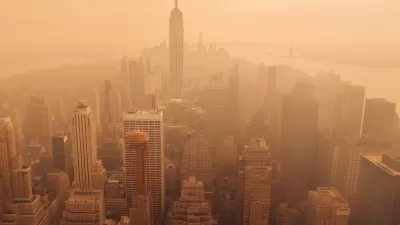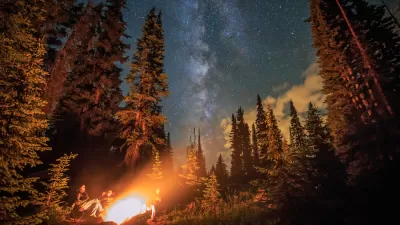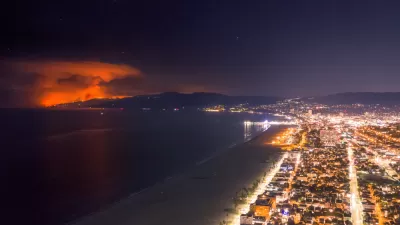The largest fire in the state history is burning in Washington. This year's particularly bad fires had predictable, perhaps preventable, origins.
"More than 900,000 acres have already burned this year in Washington wildfires, more than doubling last year’s total, and the Okanogan complex fire is the largest in state history," reports Evan Bush in a feature article examining the cause of this year's devastating wildfire season.
Bush notes that the state's wildfires were predictable, before they became unprecedented. He goes on to list some of the causes for the size and number of conflagrations, with more details describing each:
- The forests and grasslands are not healthy.
- Government spends too little on wildfire-prevention measures.
- Drought has choke Northwest forests of moisture.
- More people are living in wildland areas.
- Climate change won't help.
That penultimate point is worth noting in planning circles—as settlements continue to spread, so too does risk from wildfires.
FULL STORY: Why we have such large wildfires this summer

Planetizen Federal Action Tracker
A weekly monitor of how Trump’s orders and actions are impacting planners and planning in America.

Restaurant Patios Were a Pandemic Win — Why Were They so Hard to Keep?
Social distancing requirements and changes in travel patterns prompted cities to pilot new uses for street and sidewalk space. Then it got complicated.

Map: Where Senate Republicans Want to Sell Your Public Lands
For public land advocates, the Senate Republicans’ proposal to sell millions of acres of public land in the West is “the biggest fight of their careers.”

Maui's Vacation Rental Debate Turns Ugly
Verbal attacks, misinformation campaigns and fistfights plague a high-stakes debate to convert thousands of vacation rentals into long-term housing.

San Francisco Suspends Traffic Calming Amidst Record Deaths
Citing “a challenging fiscal landscape,” the city will cease the program on the heels of 42 traffic deaths, including 24 pedestrians.

California Homeless Arrests, Citations Spike After Ruling
An investigation reveals that anti-homeless actions increased up to 500% after Grants Pass v. Johnson — even in cities claiming no policy change.
Urban Design for Planners 1: Software Tools
This six-course series explores essential urban design concepts using open source software and equips planners with the tools they need to participate fully in the urban design process.
Planning for Universal Design
Learn the tools for implementing Universal Design in planning regulations.
Heyer Gruel & Associates PA
JM Goldson LLC
Custer County Colorado
City of Camden Redevelopment Agency
City of Astoria
Transportation Research & Education Center (TREC) at Portland State University
Camden Redevelopment Agency
City of Claremont
Municipality of Princeton (NJ)





























